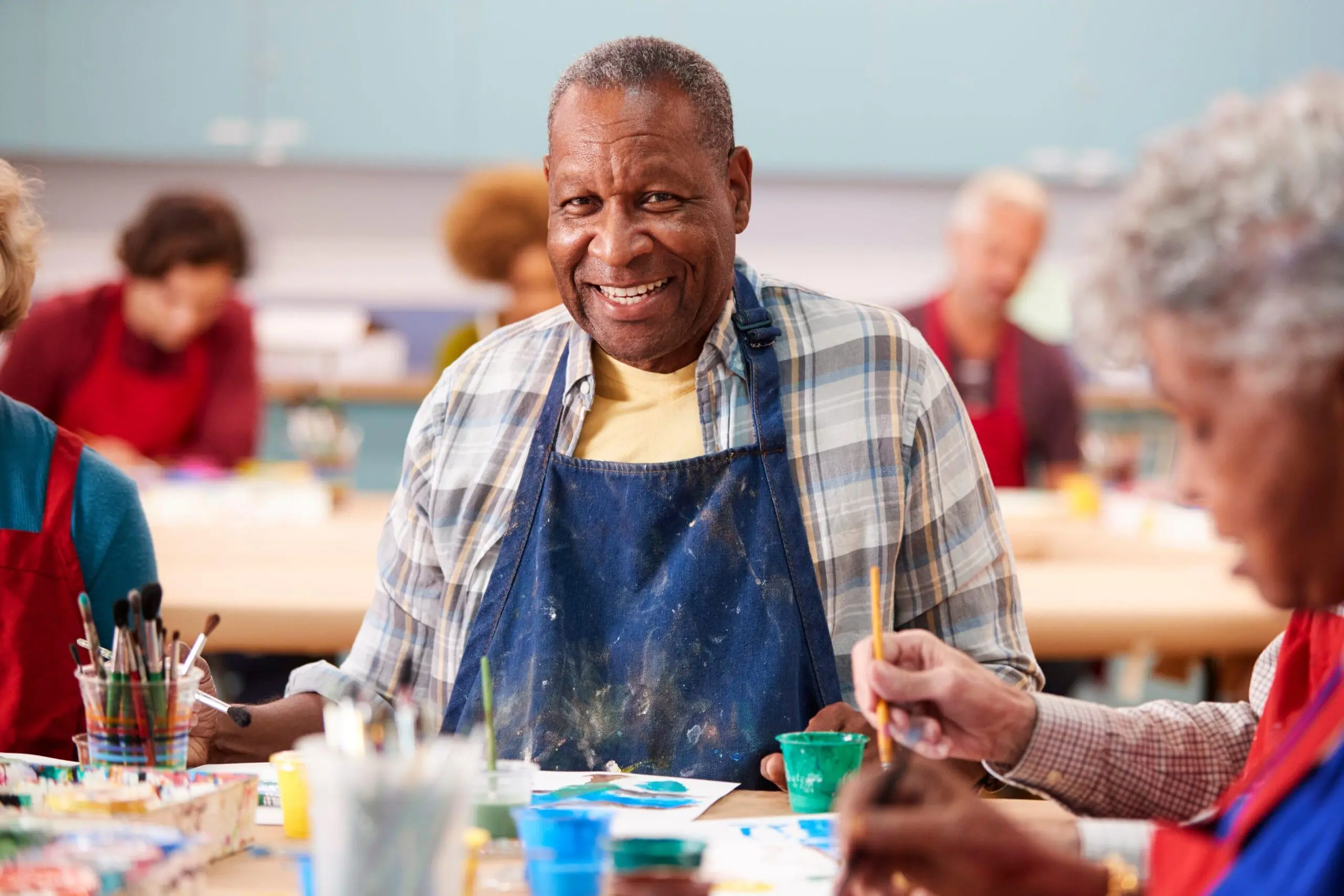How to Stay Mentally Sharp as You Age

Many people fear cognitive decline as they age. What if we said that severe age-related memory loss doesn’t have to be a foregone conclusion? By actively working on aspects of your physical and mental health, you could learn how to stay mentally sharp as you age.
5 Ways to Boost Brain Health While Aging
Older adults aren’t powerless when it comes to maintaining brain function; the following are just a few methods anyone can use to maintain a healthy brain while aging.
1. Eat Well
There just about isn’t anything in your life that can’t be improved with a proper diet—including brainpower! Studies suggest that by eating better foods and nurturing the body with the right nutrients, vitamins, and minerals, we can help promote better mental functioning, even in old age.
For instance, research has consistently linked high blood pressure and high cholesterol to poor health outcomes, including reduced cognitive function.
One of the best ways to manage blood pressure and cholesterol? Enjoying a healthy diet full of the following:
- Antioxidants, which are naturally found in food like avocados and blueberries.
- Foods with anti-inflammatory properties like tomatoes and almonds.
- “Good” fats (unsaturated fats), like omega-3 fatty acids found in olive oil and salmon.
- Whole grains like quinoa and brown rice.
- Vegetables, especially leafy greens like spinach and kale.
- Healthy proteins found in foods like beans and eggs.
2. Exercise Regularly
Besides enjoying a healthy diet, getting plenty of physical activity can also help reduce the risk of cognitive decline, according to the Centers for Disease Control and Prevention (CDC).
How does that work?
For starters, research shows that aerobic exercises (swimming, walking, etc.) can boost blood flow to the brain, which may yield positive results for cognition (although further research is needed to confirm this hypothesis). Some studies in rats also suggest that exercise can mitigate the death of brain cells (or even promote the growth of new ones!) in the hippocampus, the part of the brain associated with memory formation and retention.
Overall, a healthy lifestyle that prioritizes physical activity can work wonders for the aging brain. So, just how much exercise do older adults need?
According to the CDC, people over the age of 65 need about 150 minutes (2 1/2 hours) of moderate activity or 75 minutes of high-intensity exercises every week.
3. Get Enough Sleep
One of the best things you can do for brain health? Sleep!
Researchers have linked not getting enough sleep in middle age with a greater likelihood of developing Alzheimer’s disease later in life. While experts are not 100% certain how sleep influences the likelihood of developing Alzheimer’s, some speculate that sleeping helps remove beta-amyloid from the brain, meaning that sleep deprivation could cause amyloid buildup in the brain. When beta-amyloids build up, it can lead to plaques that can cause Alzheimer’s.
Conversely, experts associate good sleep habits with a lower risk of dementia, including Alzheimer’s disease. That means that it pays to prioritize sleep regularly (and no, research suggests that you cannot “make up” sleep deprivation from one night by oversleeping at a later time).
Good sleep habits include:
- Cutting alcohol and caffeine several hours before sleep.
- Avoiding bright lights—especially blue lights—at least an hour before bedtime.
- Keeping a consistent sleep schedule.
4. Stay Mentally Active
Our brain requires just as much exercise as the rest of our body to stay healthy. That’s why many claim that brain games like Sudoku can help keep the brain sharp—although research on the subject so far shows no major boosts to memory from many popular brain games. We aren’t saying that there is harm in playing these games—they are fun, after all—but we are saying not to expect miracle results from downloading brain-training apps and games.
So, if crossword puzzles can’t help prevent memory impairment, how can someone stay mentally active?
The key to keep the mind active at any age may rest in learning new skills, such as learning a new language. One study, for example, showed promising results: by “living in environments which stimulate learning,” neurons were more likely to survive (and perhaps even form) in adult rats.
5. Socialize
As human beings, our need for social connections is as important as our need for shelter, food, and water—we can’t live without it! In fact, one of the biggest ways older adults can boost brain activity is through fostering healthy social connections, as plenty of research shows that loneliness and social isolation in older adults can contribute to a host of health problems—including cognitive decline and a higher risk of dementia.
While in person interactions are great, using phones or even writing letters can also help older adults maintain a sense of connection and community, combatting the devastating effects of loneliness no matter where they live.
How We Nurture the Mind at St. Andrew’s
St. Andrew’s is all about promoting the physical, spiritual, and mental health of older people and their loved ones.
We nurture in-person interactions every single day, from conversations over meal times to supportive spiritual gatherings. Our staff ensures all older adults in our community have plenty of options to exercise, from group wellness classes to gardening to secure outdoor walkways. We offer all residents (and visiting family members) healthy, delicious meals. By hosting trivia and game nights and encouraging residents to learn new skills, we promote their independence and encourage them to remain intellectually curious and mentally active.
No matter what stage of life someone is in, no matter their skill set, we take the time to learn and care for each individual that comes through our doors and encourage them to be the best version of themselves while offering a robust social support system they know they can rely on.
Contact us today to learn more about how we promote the mental well-being of our communities.
Disclaimers - This article is for informational purposes only and cannot be used to diagnose, treat, cure, or prevent any disease or condition.







